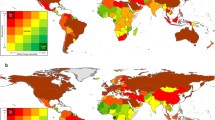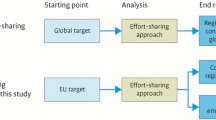Abstract
Despite worldwide policy efforts such as the Kyoto Protocol, the emission of greenhouse gases (GHG) remains a negative externality. Economic equilibrium paths in the presence of such an uncorrected externality are inefficient; as a consequence, there is no real economic opportunity cost to correcting this externality by mitigating global warming. Mitigation investment using resources diverted from conventional investments can raise the economic well-being of both current and future generations. The economic literature on GHG emissions misleadingly focuses attention on the intergenerational equity aspects of mitigation by using a hybrid constrained optimal path as the “business-as-usual” benchmark. We calibrate a simple Keynes-Ramsey growth model to illustrate the significant potential Pareto improvement from mitigation investment and to explain the equilibrium concept appropriate to modeling an uncorrected negative externality.
Similar content being viewed by others
References
Arrow, K.: Global Climate Change: A Challenge to Policy. Economists’ Voice (June), 1–5 (2007)
Asheim, G., Mitra, T., Tungodden, B.: Sustainable recursive social welfare function, Econ Theory (this issue) (2011)
Barker, T.: The economics of dangerous climate change. Clim. Change 173–194 (2008)
Burniaux, J.-M., Oliveira Martins, J.: Carbon leakages: a general equilibrium view, Econ Theory (this issue) (2011)
Chichilnisky G.: North-South trade and the global environment. Am Econ Rev 84, 851–874 (1994)
Chichilnisky, G.: Sustainable markets with short sales, Econ Theory (this issue) (2011)
Chichilnisky, G., Eisenberger, P.: Asteroids: assesing catastrophic risks. J Probab Stat 2010 Article ID 954750, 15 p (2010)
Chichilnisky G., Heal G.: Who should abate carbon emission? An international perspective. Econ Let 44, 443–449 (1994)
Chichilnisky G., Sheeran K.: Saving Kyoto. New Holland, UK (2009)
Chipman, J.S., Tian, G.: Detrimental externalities, pollution rights, and the “Coarse Theorem”. Econ Theory (this issue) (2011)
Dutta, P.K., Radner, R.: Capital growth in a global warming model will China and India sign a climate treaty? Econ Theory (this issue) (2011)
Figuieres, C., Tidball, M.: Sustainable exploitation of a natural resource: a satisfying use of chichilnisky’s criterion, Econ Theory (this issue) (2011)
Foley D.K.: The economic fundamentals of global warming. In: Harris, J.M., Goodwin, N.R. (eds) Twenty-First Century Macroeconomics: Responding to the Climate Challenge, chap. 5., Edward Elgar Publishing, Cheltenham and Northampton (2009)
IPCC.: Climate Change 2007, the Fourth IPCC Assessment Report. http://www.ipcc.ch/ipccreports/ar4-syr.htm (2007). Accessed 10 August 2008
Karp, L., Zhang, J.: Taxes versus quantities for a stock pollutant with endogenous abatement costs and asymmetric information. Econ Theory (this issue) (2011)
Lauwers, L.: Intergenerational equity, efficiency and constructibility, Econ Theory (this issue) (2011)
Lecocq, F., Hourcade, J.-C.: Unspoken ethical issues in the climate affair insights from a theoretical analysis of negotiation mandates. Econ Theory (this issue) (2011)
Nordhaus W.D.: A Question of Balance: Weighing the Options on Global Warming Policies. Yale University Press, New Haven (2008)
Nordhaus W.D., Boyer J.: Warming the World. MIT Press, Cambridge (2000)
Ostrom, E.: Nested externalities and polycentric institutions: must we wait for global solutions to climate change before taking actions at other scales? Econ Theory (this issue) (2011)
Rezai A.: Recast the DICE and its policy implications. Macroecon Dyn 14, 275–289 (2010)
Samuelson P.A.: A catenary turnpike theorem involving consumption and the golden rule. Am Econ Rev 55, 486–496 (1965)
Shiell M.L., Lyssenko N.: Computing business-as-usual with a representative agent and a pollution externality. J Econ Dyn Control 32, 1543–1568 (2008)
Stern N.: The Economics of Climate Change: The Stern Review. Cambridge University Press, Cambridge (2007)
Tol R.: The economic effects of climate change. J Econ Prespective 23, 29–51 (2009)
Author information
Authors and Affiliations
Corresponding author
Additional information
We received helpful comments from Larry Karp and an anonymous referee. Support from the Schwartz Center for Economic Policy Analysis is gratefully acknowledged.
Rights and permissions
About this article
Cite this article
Rezai, A., Foley, D.K. & Taylor, L. Global warming and economic externalities. Econ Theory 49, 329–351 (2012). https://doi.org/10.1007/s00199-010-0592-4
Received:
Accepted:
Published:
Issue Date:
DOI: https://doi.org/10.1007/s00199-010-0592-4




